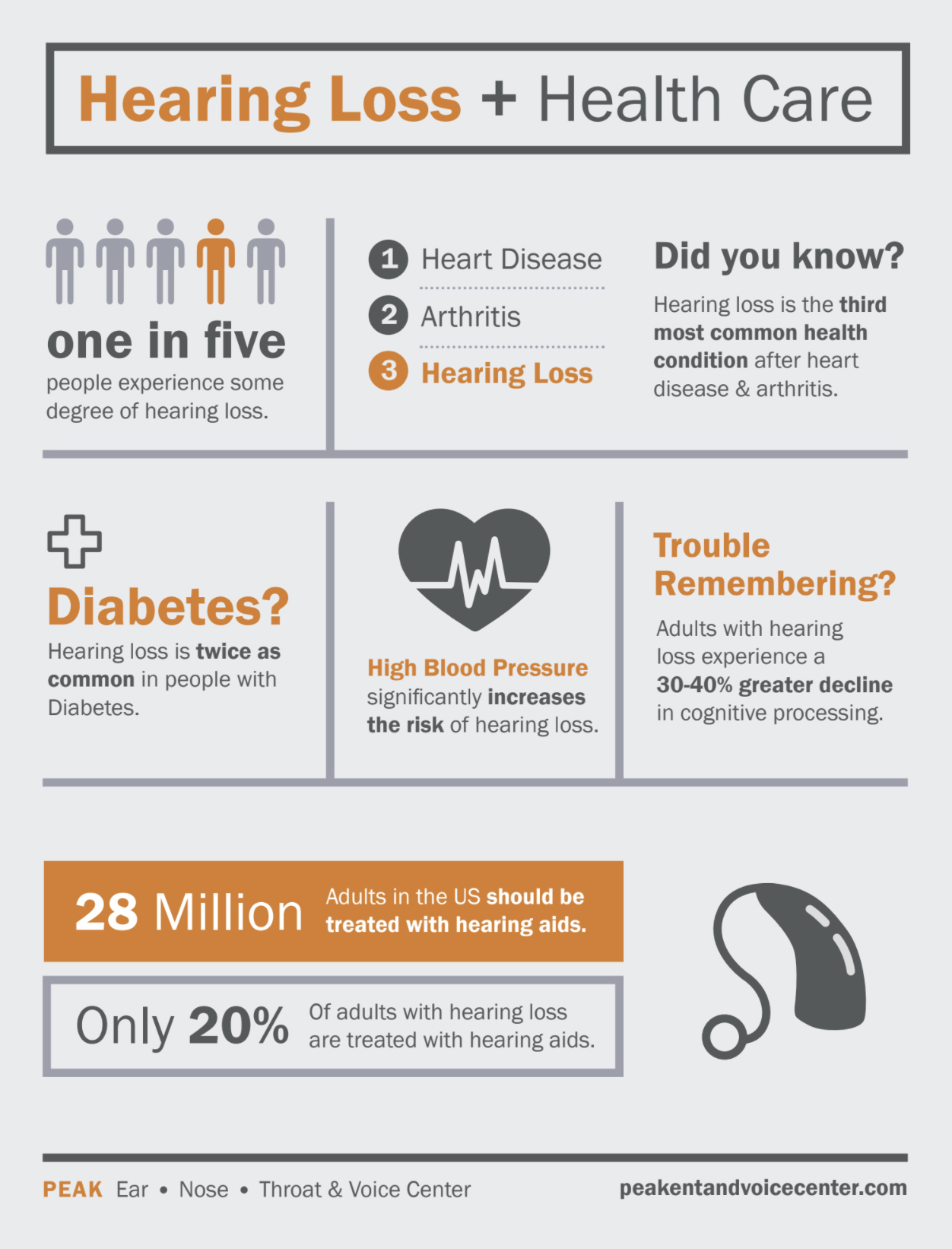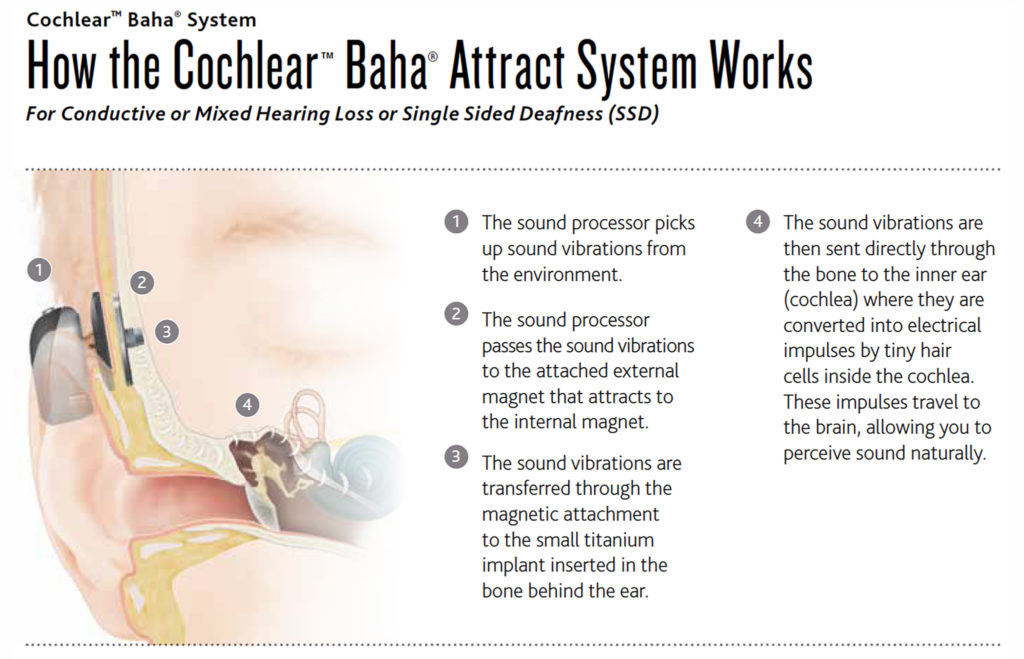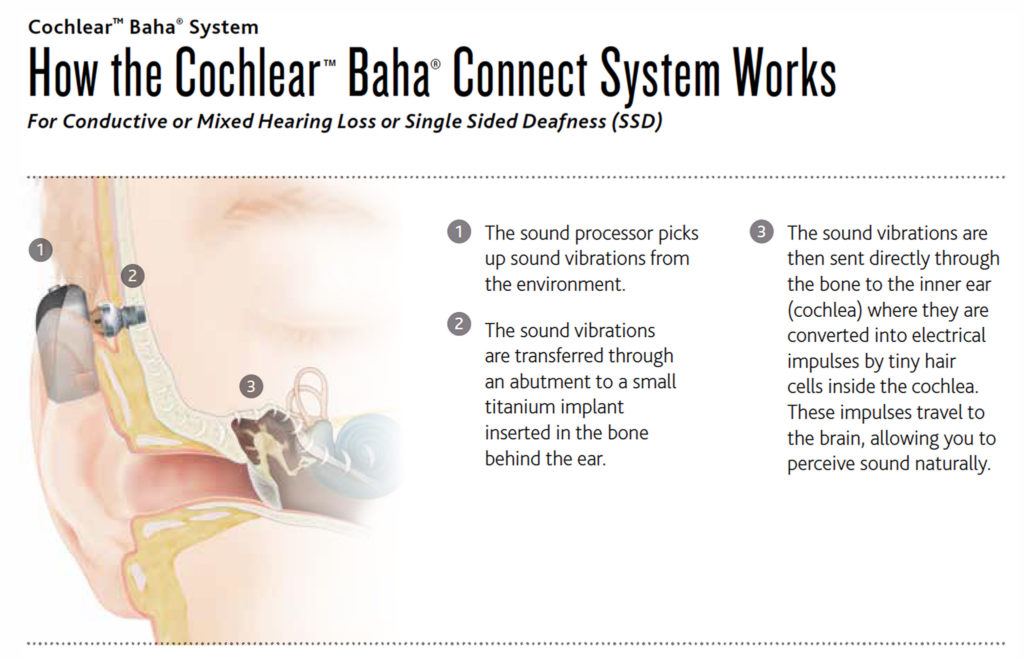Hearing Specialists &
Hearing Aids
Home » colorado hearing clinic
Hearing and Hearing Loss Issues & Problems | Broomfield • Golden • Brighton
About 48 million Americans live with a degree of hearing loss — from mild to severe, according to the Hearing Loss Association of America. As the third most common physical condition, it is a major public health concern striking anyone at any age.
When you detect a change in your hearing, especially after being exposed to excessive noise, it is critical to seek medical attention from our hearing clinic in Denver.
Ask yourself these questions:
- Do you have difficulty hearing and understanding in conversations with friends and family?
- Do you have difficulty understanding in noisy places?
- Do you frequently need others to repeat themselves? Do you experience ringing or buzzing sounds in your ears?
If you answered yes to any of these questions , then we are here to help! Peak Hearing specializes in providing patient centered medical treatment of hearing loss and tinnitus. We believe that audiology and hearing care is health care and that patient success requires two things: Patient Choice and Exemplary Patient Care.
Patient Choice
We are a hearing and balance clinic in Colorado that assesses and treats hearing and balance disorders. At our practice, we focus on ensuring patient autonomy and choice. We want you to play an active role in the care process, so we collaborate with you to create a custom treatment plan. With our patients playing a more significant role in decision-making, we ensure greater satisfaction.
Exemplary Patient Care
Our trained physicians and audiologists conduct diagnostic tests and provide hearing aid services at our state-of-the-art facility. As a clinic that takes in only the top providers in Colorado, we are the leading choice among patients for our hearing loss services. Our hearing aid specialists provide compassionate care and guide you in choosing the appropriate hearing aids for your situation.
Our Audiologists

Carly Amurao, Au.D.
(Audiologist)
- Audiologist providing full spectrum of Pediatric and Adult Hearing Care
- Specialty interest in Hearing loss and treatment with hearing aids, Tinnitus Evaluations and Tinnitus Treatment Therapies

Kinsley Hodgson, Au.D.
(Audiologist)
- Adult and pediatric hearing evaluations
- Hearing loss solutions for adults
- Hearing aid programming and repairs
- Custom hearing protection
- Assistive listening devices

James Skordas, Au.D.
(Audiologist)
- Adult and pediatric hearing evaluations
- Hearing loss solutions for adults
- Hearing aid programming and repairs
- Custom hearing protection
- Assistive listening devices
How We Hear
- Outer Ear
- Middle Ear
- Inner Ear
OUTER EAR
The pinna collects sound waves as they move through the air and directs them into the external ear canal where they are carried directly to the tympanic membrane (eardrum).
MIDDLE EAR
The tympanic membrane vibrates in response to sound waves. Sound vibrations move from the tympanic membrane through the ossicles (middle ear bones) to the cochlea.
INNER EAR
Sound vibrations cause the fluid and tiny hair cells inside the cochlea to move. Neural signals are created by movement of the hair cells and those signals activate the auditory nerve. The auditory nerve signals the auditory cortex of the brain and those signals are interpreted as sounds and speech.
Better Hearing Can Start Today.
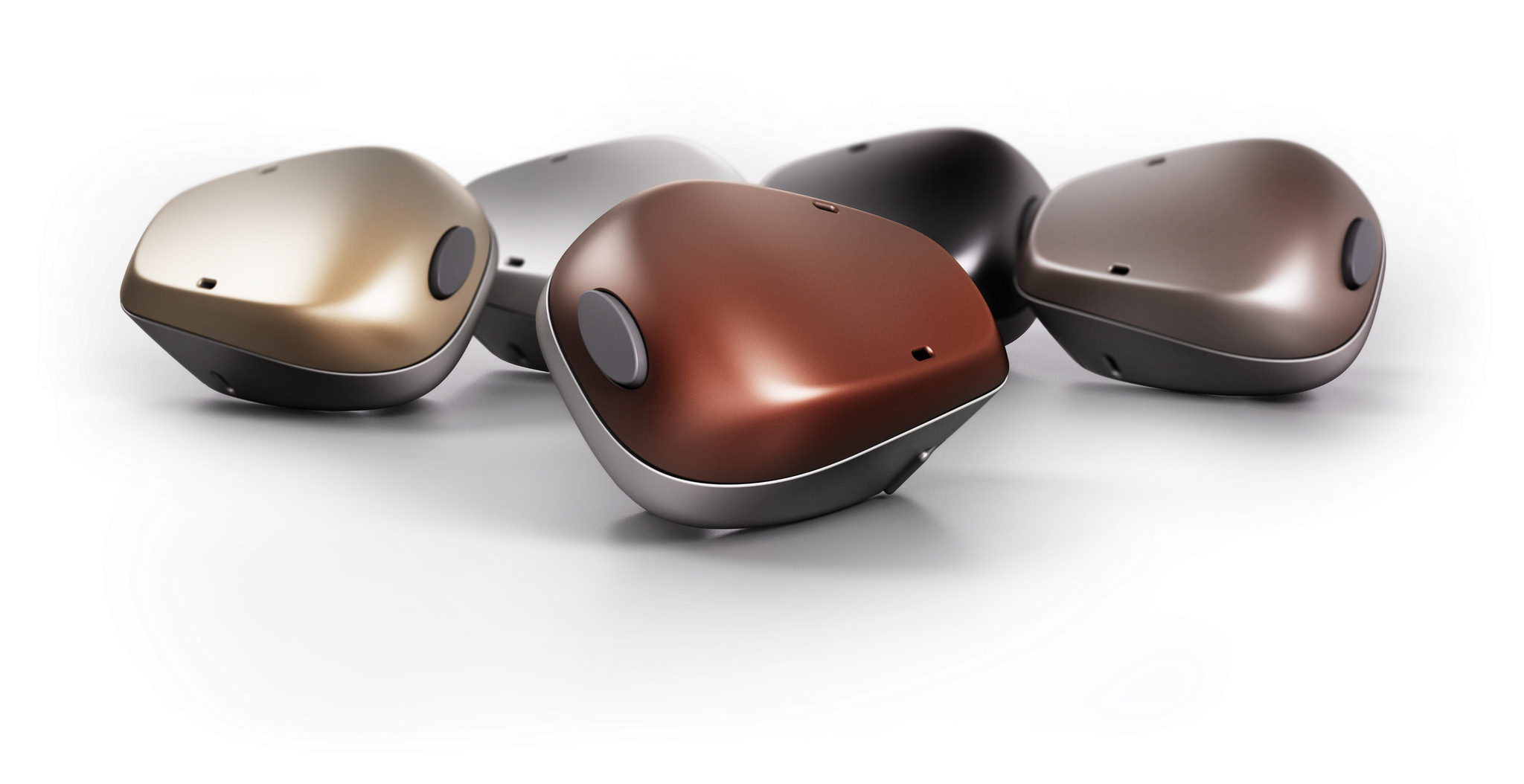
We Specialize In Bone Conduction Implants
Don’t let your hearing hold you back! Our doctors specialize in Bone Induction Implants, designed to take your hearing further. Download the fact sheet below for more information.
Our Hearing and Hearing Loss Department

Hearing

Audiology
Our Services Include:
- Comprehensive Diagnostic Hearing Evaluations for Adults and Pediatrics
- Tinnitus Evaluations and Treatment
- Hearing Aid Consultations, Evaluations, Fittings, and Adjustments
- Hearing Aid Repairs
- Musician Ear Plugs
- Hearing Protection
- Assistive Listening Devices
- Custom Ear Products

Tinnitus
Tinnitus, which affects nearly 50 million Americans, refers to the perception of an extra sound that is not generated by anything external to the body. It is commonly described as ringing, buzzing, hissing, chirping, or roaring. It can affect one or both ears, or simply be perceived as a “head noise” without a clear direction or origin. It may be continuous or intermittent, steady or pulsatile, low or high pitch and may range in intensity from very soft to severely loud.
What Causes Tinnitus?
Some potentially serious causes of tinnitus exist and your doctor may recommend specific testing if one of these causes is suspected. The vast majority of tinnitus cases, however, are thought to be related to some degree of damage to the delicate hair cells within the inner ear, which are responsible for hearing. This damage can occur as a result of the normal aging process, exposure to loud noise, exposure to toxins or certain medications and other less common disorders.
How is Tinnitus Treated?
Tinnitus rarely goes away completely on its own. In about 25% of patients, tinnitus may actually get worse over time. In many patients, however, it becomes less bothersome with time. Unfortunately, there is no “magic bullet” or quick-fix for tinnitus. There are several treatment options to help manage tinnitus and a thorough evaluation by one of our audiologists or ENT physicians can help determine an appropriate treatment strategy for you.
Other Information:
Tinnitus, or a ringing, buzzing sound in the ear, is caused when the sound-sensitive cells within the cochlea are damaged. The most common form of tinnitus is subjective tinnitus in which only the sufferer can hear buzzing or ringing sounds. This type typically affects the outer, middle, or inner ear. The second type of tinnitus is classified as objective tinnitus and can be observed by a doctor during an examination. This relatively rare form of tinnitus is often caused by a blood vessel problem, muscle contractions, or a bone condition in the middle ear. The most common cause is a prolonged exposure to loud sounds and up to 90% of individuals experience some degree of hearing loss.
Other Causes May Include:
- Earwax buildup
- Changes in the ear bones
- Prolonged exposure to loud noises
- Age related hearing loss
- Temporary hearing loss due to viruses, colds, and ear infections
Other Factors Which Increase Risk of Tinnitus:
- Certain medications including:
- Diuretics
- Cancer medications
- Antibiotics
- Antidepressants
- Large quantities of Aspirin
- Quinine medications
- Gender (men are at higher risk of developing tinnitus)
- Smoking
- Cardiovascular disorders which affect blood flow such as high blood pressure and narrowed arteries
Other Complications:
Some individuals experience additional symptoms in conjunction with tinnitus including:
- Sleeping difficulties
- Memory problems
- Depression
- Stress
- Fatigue
- Difficulty concentrating
- Anxiety
- Irritability
Hearing loss occurs when sound is blocked from getting to the brain. A number of problems can prevent sound from being properly transmitted at any point along the normal route described above. The most common cause of hearing loss (and most preventable) is exposure to loud noise. Infections, both of the ear or elsewhere in the body, are also a major contributor to hearing loss. Most causes of outer ear hearing loss can be remedied, but problems of the middle and inner ear can lead to permanent hearing loss. It is important to seek medical attention quickly if you are experiencing a problem hearing, especially if hearing loss is a sudden change. Here are some common causes of hearing loss depending on the location of the problem:
- In the Outer Ear: Ear wax build-up, infections that cause swelling, a growth in the ear canal, injury, or birth defects can restrict hearing in the outer ear.
- In the Middle Ear: Fluid build-up is responsible for the most common infections in the middle ear. Fluid in the middle ear prevents the bones from processing sounds properly. Tumors, both benign and malignant, can also result in hearing loss in the middle ear.
- In the Inner Ear: Aging effects and long-term noise exposure cause damage to the cochlea (hearing organ), vestibular labyrinth (which regulates balance), or the auditory nerve (nerve that sends sound signals to the brain).
Other causes of hearing loss include:
- Presbycusis: Age-related hearing loss, such as having difficulty hearing in noisy places, having trouble understanding what people are saying, or not registering softer sounds.
- Meniere’s Disease: An inner ear disorder that causes hearing loss, vertigo/dizziness and sometimes ringing.
- Heredity and Genetic Causes: Many diseases and syndromes that are either genetic or hereditary can cause hearing loss. Some, like rubella (German measles) occur when a pregnant mother has the disease, which causes hearing loss in the baby. Other, rarer types of hereditary and genetic causes include CHARGE Syndrome, Connexin 26 disorder, Goldenhar Syndrome,Treacher Collins Syndrome, Usher Syndrome and Waardenburg Syndrome.
- Otosclerosis: A hereditary disorder caused by growth of spongy bone tissue in the middle ear. This results in abnormal sound transmission through the middle ear bones causing muffled hearing.
- Cholesteatoma: A benign growth starting in the middle ear that erodes bone and the eardrum.

Hearing Aids
If you’ve been diagnosed with hearing loss, you might be wondering what happens next. The most common form of treatment for hearing loss is hearing aids; and while they do not “treat” your condition, they do make it easier for you to hear and communicate during your day-to-day activities.
But just as having your condition diagnosed is important, it’s also crucial to select the right hearing aids for your specific set of needs. When you select a hearing device, you want to consider the severity of your hearing loss and your lifestyle and budget. At Peak Hearing and Tinnitus, we offer the best hearing products from the top hearing aid manufacturers.
Styles of Hearing Aids
Hearing aids are available in many different sizes and styles thanks to advancements in digital technology and miniaturization of the internal components. Many of today’s hearing aids are considered sleek, compact and innovative – offering solutions to a wide range of hearing aid wearers.
Various hearing aid styles we offer:
- In-The-Ear
- Invisible in-the-Canal (IIC)
- Completely-in-the-Canal (CIC)
- In-the-Canal (ITC)
- Full Shell or In-the-Ear (ITE)
- Behind-the-Ear (BTE)
- Mini BTE with slim tube and tip
- Receiver-in-the-ear (RITE)
- BTE with earmolds
Hearing Protection
- Earplugs and Earmolds for Hunting
- Earplugs and Earmolds for Music
- Earplugs and Earmolds for Swimming
- iCustom
- DefendEar 1
- DefendEar 2
- DefendEar Hunter
Hearing Aid Products and Accessories by Manufacturer
Bluetooth Hearing Aids
When you select a hearing aid, it’s essential to consider what features you need in a device. We offer a number of different Bluetooth-enabled hearing aids to help you connect hands-free and carefree to other compatible devices, such as: speakers, hearing systems, cell phones, and televisions. LEARN MORE
Oticon
Oticon is a people-first company. That means in addition to a line-up of advanced hearing products, they’re dedicating time and research to finding out what people really want and need. When you select a hearing product from Oticon, you know you are not only getting a quality device, but one that was created with you in mind. LEARN MORE
Phonak
The primary goal at Phonak is to improve the quality of life for individuals with hearing loss. Because of this vision, Phonak offers a variety of different hearing aid styles, models and features to ensure they have something for everyone. LEARN MORE
Rechargeable Hearing Aids
Hearing aids are highly advanced devices that rely on batteries to keep them powered. We offer a variety of different rechargeable hearing products to make your experience with hearing aids easier. LEARN MORE
ReSound
ReSound offers quality devices that focus on the wearer’s listening experience. They offer a number of features to make your hearing aids customizable to your specific hearing loss needs. LEARN MORE
Our ReSound Hearing Aids and Accessories
Signia/Siemens
Signia/Siemens produces highly-advanced devices for individuals with auditory conditions. With a plethora of styles, models and features to choose from. The line-up of hearing aids produced by Signia/Siemens ensures everyone can find the perfect device for their needs. LEARN MORE
Starkey
The Starkey Halo is the latest hearing device produced to work with the iPhone. This allows for easy streaming and hearing aid adjustments in one location. Using the TruLink app, connecting and controlling your hearing devices has never been easier. LEARN MORE
Our Starkey Hearing Aids and Accessories
Unitron
Unitron stands behind the hearing products they provide. When you select a Unitron hearing aid, you can be sure you are getting an advanced device that will help you hear the world around you again. LEARN MORE
Widex
The professionals at Widex combine knowledge with years of experience to provide you with the best hearing solutions you need for your auditory health. With innovation and technology driving our focus, you can rest assured you will find the treatment you need in a Widex hearing aid. LEARN MORE
Implantable Hearing Aids
The Cochlear™ Baha® Attract System is a highly effective bone conduction hearing system designed to leave the skin intact. It uses a magnetic connection to attract the sound processor to the implant, sending sound to the inner ear without anything breaking the skin.
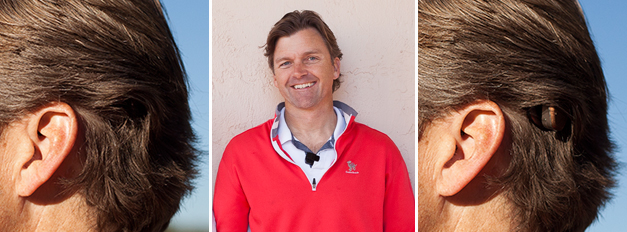 Your Invisible Connection to Sound
Your Invisible Connection to Sound
If you have conductive hearing loss, mixed hearing loss or single-sided deafness then the Baha Attract System may be a good option to help you hear better. The Baha Attract System is a comfortable and easy to use hearing system that requires no daily skin care. The sound processor is easy to handle and simply snaps onto a sound processor magnet to hold it in place. For added comfort and performance, the sound processor magnet features a unique Baha SoftWear™ Pad that gently adapts to the skin to improve wearing comfort. The system is based on a reliable Baha Implant with unique TiOblast™ surface technology that is proven in a long-term study to be our most stable implant ever.1 The superior stability of the implant means you may get access to sound sooner than ever before. Depending on the recommendation of your healthcare professional, this could be as early as four weeks after surgery.How the system works
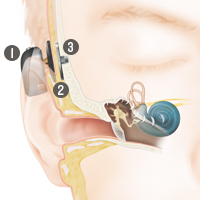 A small titanium implant sits in the bone behind your ear. Attached to the implant is an implant magnet that is hidden beneath the skin.
A small titanium implant sits in the bone behind your ear. Attached to the implant is an implant magnet that is hidden beneath the skin.The sound processor fits onto the sound processor magnet which attracts to the internal magnet to hold it in place. Sound travels as vibrations from the processor via the magnets to the implant, which then directs the vibrations through the bone to stimulate the inner ear.
- Sound processor
- Magnetic connection
- Implant
References and more detailed information can be found at Cochlear™ Baha® Attract System

